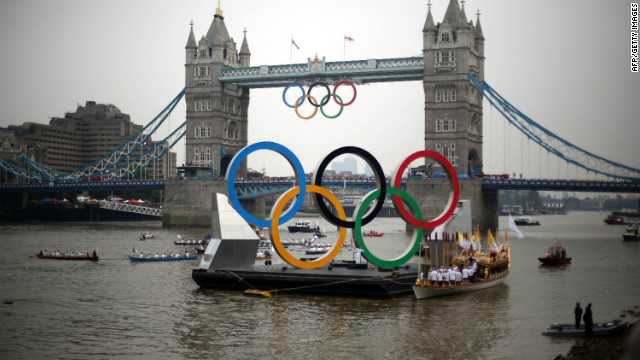Business leaders put UK on Olympic trial
July 30, 2012 -- Updated 0445 GMT (1245 HKT)

The giant Olympic rings are pictured next to Tower Bridge on the final day of the London 2012 Olympic Torch Relay on Friday.
Olympics to raise tough questions about the coalition's management of Britain's stagnant economy and the country's vulnerability to a euro break-up.
While David Cameron is
trying to use the games as a showcase to boost UK trade and investment,
chief executives from the US and Asia -- many of them big investors in
Britain -- are privately voicing anxiety at the state of the economy.
"Cameron is giving us a
big sales pitch, but we are not taking any notice of that," said the
head of an Asian multinational. "We want to know what's happening to the
economy and what are the prospects for us."
One US corporate chief
called bluntly for the government to change course after last week's
official figures showed the UK economy shrank 0.7 per cent between April
and June.
"You need a short-term
fiscal policy to boost demand and a credible long-term plan to address
welfare, taxes and the labour market. If you do that, the bond market
will be fine," he said.
As business leaders
gathered to watch the games, in which ironically Britain's industrial
past played a major part of the opneing ceremony, the chatter in
corporate hospitality suites was less about sport, and more about
London's competitiveness as a financial centre. One financier, referring
to the forced resignation of Bob Diamond, the former Barclays chief
executive, said: "What's going on in London? You are killing your
bankers."
"Bob got shot by the
regulators," added another high-profile executive, expressing concern
about pressure exerted by the Bank of England and the Financial Services
Authority for Mr Diamond to quit. "There are big implications for
London from all of this. When you're abroad you get a lot of people
saying 'who would ever want to work for a British bank?' "
Some of the concerns
surfaced publicly at last Thursday's global investment conference at
Lancaster House in London, where Mr Cameron faced awkward questions
about airport expansion and immigration in front of 200 business leaders
and policy makers.
What's going on in London? You are killing your bankers
- Financier visiting Olympics
Government officials say
there was a "solid, constructive" atmosphere at a series of meetings
and that it is right for Britain to use the Olympics as a trade
opportunity, even if the benefits are hard to define at this stage. The
government hopes to win £1bn in UK trade deals from conferences at
Lancaster House, converted into a British Business Embassy for the
Olympics.
So far, Jaguar Land Rover -- part of India's Tata industrial group -- has announced 1,100 more car-making jobs in the Midlands.
But the executives'
worries may increase pressure on George Osborne, the chancellor, who
told the conference he would resist "siren voices" calling for a change
of economic course.
Many are preoccupied by
the eurozone crisis and its implications for the UK. "What is Britain
going to do? What is the plan?" asked one international policy maker.
"Why is Britain not being more proactive?"
Additional reporting by Patrick Jenkins



No comments:
Post a Comment